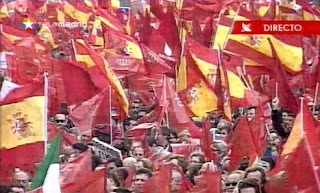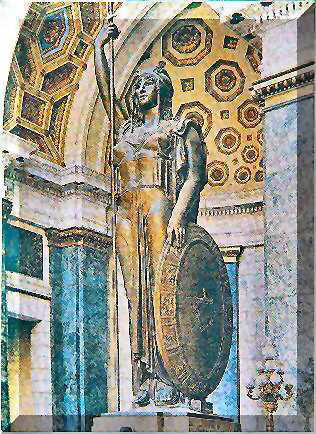The idea of a blog is one that would certainly have resonated deeply with José Martí. In fact, he might well be regarded as one of the pioneers of this genré. Of course, he didn't conceptualize it, although he did believe that poets inspired inventors, and that it was possible to find the antecedents of all great scientific theories and inventions in the imaginations of poets before they materialized in the laboratories of scientists. As Martí saw it, poets not only celebrated the great inventions of the age but actually had a part in bringing them about. This is is a decidedly romantic concept and one that would have found many adherents in that age. The earliest Romantic, the great German poet Goethe (1749-1832), had been the first to observe this: "Life is always fumbling towards the very thing that the great poets and artists create."
No doubt the literature of the last 100 years (especially the pulpish kind that is not taught in schools) would reveal many anticipations of the computer and of its potentialities. Whether blogging also has been presaged in the literature of the last 100 or 200 years, I do not know. I suppose I could google examples readily enough but I would only lose my train of thought for something that can well be taken as a given.
Blogging, as I see it, is the desire to share your truth with the world, the belief that your truth matters, and the conviction that your truth can better the world by adding to the sum of human knowledge or lessening the quantity of human suffering. There are more frivolous reasons for blogging, of course, but those would not resonate with Marti. The rationale for blogging, if not the mechanics, is amply evident in all of Marti's writings. Among them one group in particular features many modalities we have come to associate with blogging: brief and succinct tableaux of the news of the world, especially those items that would appeal to a general audience, presented on a daily or almost daily basis, sometimes embellished with observations or not, depending on content, and generally gleamed from newspapers and journals, for, except on very rare occasions, Marti was not a reporter as we would understand the word today (neither, for that, are most bloggers). Although these casual paragraphs are not the
crónicas of the Gilded Age for which he is best known, they contain, in "concentrated form, as Martí says, the pulse of the world as measured by Martí, and are, like everything Martí ever wrote, highly personal and engaging. Marti received much favorable feedback for his "blogging" through the snail-mail that was the only means then to transmit it. In his own letters, the normally reticent Martí marvels that something that caused him so little trouble to write had acquired such a mass following as his Venezuelan editor (or "webmaster") Juan Luis de Aldrey assured him (there is perhaps a note of sadness here, too, because Marti's literary ambition was to be a famous playwright like the swashbuckling Echegaray ["Eche," who?], whom he emulated to perfection, alas, a case of a poor model destroying a great artist).
Marti began his "blog" — actually called the
Sección Constante — during his brief and failed residence in Venezuela in 1881. He was contracted by the newspaper
El Nacional to write a continuing series of small digests (we would call them "posts") on a variety of subjects of topical interest, including current affairs, literature and the arts, scientific discoveries and industrial advances, celebrity news and something which Marti called
"singularidades" (an anticipation of "Ripley's Belief It Or Not").
Martí averred that the public literally "ate them up" ["se la bebía"], and such was the popularity of the "Sección Constante" that he was contracted by the newspaper to continue editing it after he had relocated to the U.S. because of his refusal to write panegyrics on the country's dictator Guzmán Blanco.
What strikes one most forcibly about the "Sección Constante" today is precisely its eclectic nature. Martí's knowledge really was universal and encompassed all fields of human learning or endeavor; nothing was alien to him or insignificant in his cosmology. So what we find here is a thick slice of the world as it was 125 years ago pickled in Martí's essence. What is most remarkable is that the world then was pretty much as the world is today, with a little less useful knowledge and a great deal more learning.
There was the story, which Martí reported on January 24, 1882, concerning the construction of a new transoceanic Nicaraguan Canal under the supervision of Cuban engineer Menocal (a cousin of the future president of Cuba). Martí, incidentally, was always giving hat tips to fellow Cubans, though only one or two of his "posts" were devoted to Cuba. Well, the plan to build such a canal has been lately resurrected due to the fact that they say the Panama Canal is obsolete. Since the Nicaraguan Canal was three-quarters built by the French in the 19th century before being abandoned for lack of funding it might be possible to follow the old route. The U.S. itself nearly finished the Nicaraguan Canal a century ago before abandoning it and switching over to Panama because a postage stamp depicting an active volcano led American officials to suppose that the volcano might erupt and fill up the canal again!
This "post" is followed immediately by another on the use of the residue from sugar cane production
(bagazo) to make excellent paper. Martí writes that the glowers in Louisiana can only extract 60% of the sugarcane juice from the bagasse which makes it unsuitable for papermaking. Although he doesn't say so directly the only inference is that such paper could be made to perfection in Cuba, where they know how to get the juice out of the sugar cane. Indeed, Cuba in the 1970s perfected this process out of necessity because Castro's criminal deforestation had made it impossible to manufacture paper from wood pulp. The bagasse paper, by the way, is everything that Martí says it is and is also edible. When Ricardo Alarcón told the Cuban people at a press conference during the "Special Period" of the 1990s about the nutritional value of grass (and was asked by a reporter whether he eats it too), he could also have advised Cubans to literally (or not literally) consume their books and newspapers.
Returning to the subject of poets presaging inventions, on January 18, 1882, Martí "posted" a story about a San Francisco photographer name Muybridge who had been able to reproduce in successive frames and with perfect definition a trotting horse. Yes, this was the birth of what 15 years later would become motion pictures. Martí, incidentally, missed being filmed (although the Spanish-American War was the first to be), but a speech of Martí's in Tampa was recorded on a wax disk, which is tragically lost. What a boon it would be to the spirit to hear Martí's voice restored to pristineness by today's technology? Perhaps it is not hopeless to expect that some day we might. Only five years ago a long-lost and -searched for recording of Walt Whitman reading one of his minor poems was found, and what a great revelation it was! Whitman had the Long Island accent of his birth with some assumed English inflections and sounded very soulful, exactly what one would expect the "Good Grey Poet" to sound like. But I am digressing, and, given the subject matter and my affinity to the subject, it can hardly me avoided.
What Martí would most have appreciated about blogging, what Whitman himself would also have hailed about it, is its democratic nature. Thanks to it anyone and everyone can have a voice at the common table. Come to think of it, Martí would probably have thought this the greatest invention of the 20th century, and he presaged it, too.






















